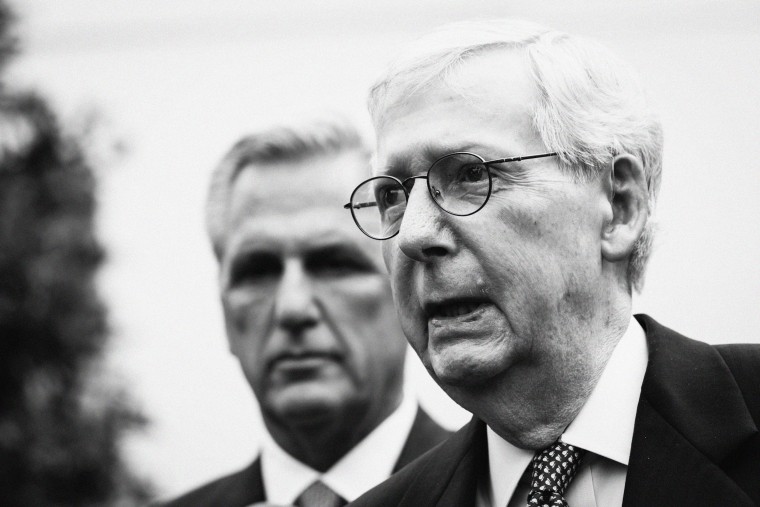WASHINGTON — The Senate is displaying a rare unified front on government funding, putting the squeeze on the Republican-led House as the Sept. 30 deadline to avert a shutdown nears.
All 12 funding bills have sailed through the Senate Appropriations Committee on bipartisan votes — some unanimous — and senators sound triumphant about completing the task.

“The Senate appropriations process has been a shining example of how things should get done in Washington,” Senate Majority Leader Chuck Schumer, D-N.Y., told reporters Wednesday. “These are times when people are divided. This is a closely divided chamber. But nevertheless, we can summarize the Senate’s work funding the government in one word: bipartisan.”
The Democratic-led chamber plans to hold votes on the first three bills — military construction and veterans affairs, agriculture and the Food and Drug Administration, and transportation and housing — starting Monday.
Senate Republican leaders are even warning Speaker Kevin McCarthy, R-Calif., that his party-line approach to fund the government by slashing spending and advancing divisive conservative measures is going nowhere in the Senate. They say that if McCarthy continues to struggle to corral the votes for funding legislation in the closely divided House, he could simply take up the Senate bills.
“They’re going to have to figure out if they can get other bills moving,” said Senate Minority Whip John Thune, R-S.D. “If they can’t, then they could pick up Senate vehicles and figure out a way to try and transact them in the House.”
Senate Minority Leader Mitch McConnell, R-Ky., said last week that the House GOP path would cut spending below the levels agreed to in the budget deal McCarthy negotiated with President Joe Biden.
“Without saying an opinion about that, that’s not going to be replicated in the Senate,” McConnell said.
In a joint statement, Senate Appropriations Committee Chair Patty Murray, D-Wash., and Vice Chair Susan Collins, R-Maine, heralded the coming floor votes as “a critical next step as we continue working collaboratively in the Senate to keep our government funded.”
It represents a reversal of the dynamic in debt ceiling negotiations, when the Senate was divided and unable to pass a bill while House Republicans approved their version on party lines, giving McCarthy the upper hand to extract concessions.
This time, McCarthy and House Republicans are struggling to pass appropriations bills while senators feel emboldened.
“We showed it’s not that hard to get not just Republican support, but conservative Republican support, for these budget bills. I do think that increases the pressure on McCarthy to come to the table,” said Sen. Chris Murphy, D-Conn. “McCarthy’s going to be saddled with a public that is pretty convinced if things fall apart here, it is the House Republicans’ fault.”
Sen. Jon Tester, D-Mont., was even blunter: “The best thing they could do is take all the work the Senate does and just pass it, because we do better work. I say that partially in jest, but it’s a fact.”
“We shouldn’t be playing games like shutting down the government,” Tester added. “That’s bull----. Let’s get this thing done.”
The pressure from the Senate highlights the challenge McCarthy will face when the House returns next week. He has publicly warned his GOP members that the Senate is passing appropriations bills overwhelmingly and that the House needs to pass its own to have a chance of securing conservative priorities.
House GOP hard-liners demand not only spending cuts but also controversial policy add-ons over issues like immigration and cutting federal funds for prosecutors who have secured indictments of former President Donald Trump. And the House Freedom Caucus is rebelling against the prospect of a short-term spending bill, which McCarthy and Senate leaders say will be necessary to buy more time.
McCarthy has told House Republicans he won’t “support any kind of play to jam against the holidays that would allow Senate Democrats to gain leverage, an omnibus [a catchall spending bill] or a long-term continuing resolution that would lock in Democrat priorities,” a McCarthy spokesperson said. “Any short-term CR would only be necessary as a way to continue working through regular order on bills that include Republican priorities to lower spending in the bureaucracy and bring necessary changes to federal policy and refocus our military to war-fighting capabilities and defense of our nation.”
Still, it raises the question of whether McCarthy will need Democratic votes to prevent a government shutdown and whether that could cause some of the hard-liners to trigger a “motion to vacate” the speaker’s chair and try to overthrow him. In his narrow majority, losing even a handful of votes could spell doom for his hold on the gavel.
“That’s the challenge that the speaker has. In my view, he’s only going to pass something with Democrat votes, and that’s what’s going to put him at risk for the motion to vacate,” Rep. Ken Buck, R-Colo., a member of the Freedom Caucus, said Wednesday on NBC’s “Meet the Press Now.”
“I don’t see the speaker getting enough Republican votes for a continuing resolution in the next few weeks to be able to pass that continuing resolution,” Buck said.
